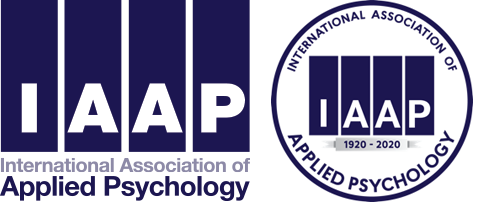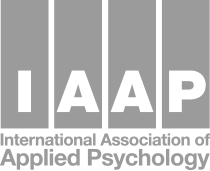Taking Well-being to the Next Step: Launch of the WISE Centre and Innovations in Government Policy Responding to the Coronavirus Pandemic
by Nathalie Stechysin, Judy Kuriansky and Jack Davis
Published November 2020
Taking Well-being to the Next Step: Launch of the WISE Centre and Innovations in Government Policy Responding to the Coronavirus Pandemic
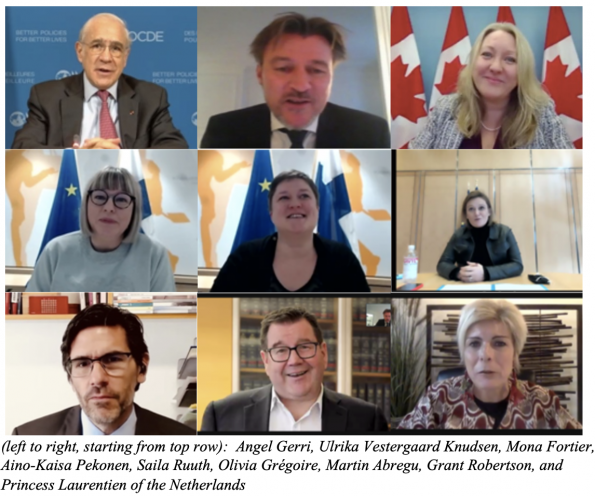
The construction of human well-being, which integrates components of health, connection, and psychosocial safety, is increasingly recognized as a salient variable within the work of international development. The recent creation of the WISE Centre, on Well-being, Inclusion, Sustainability and Equal Opportunity, launched by the Organisation for Economic Co-operation and Development (OECD), is a notable advance in the research, definition and measurement of well-being, which is increasingly important, given the heightened awareness and attention to the concept of well-being among diverse stakeholders involved in policymaking and the achievement of the global goals.
The new centre was officially launched on 25 November 2020 at a virtual event. The event featured a high-level roundtable with speakers, including the OECD Secretary-General and Deputy Secretary-General, Ministers, and representatives of civil society.
The mission of OECD is to “build better policies for better lives” and “shape policies that foster prosperity, equality, opportunity and well-being for all” (OECD, “the wise centre” section, n.d.). Now that people’s well-being is being prioritized on the global agenda, the specific goals of the new centre are even more important, namely, to improve statistical measures using innovative methodologies and to develop measurement guidelines to be useful for governments and civil society.
This report is in two parts. Part 1 reports on a presentation given by Jessica Mahoney, Research Assistant at OECD, to a graduate seminar class on “Psychology at the United Nations” at Teachers College, Columbia University taught by Professor Dr. Judy Kuriansky, a mental heath advocate who has expertise in the concept of well-being. Part 2 recounts the virtual launch of the OECD’s new WISE Centre.
This report is by the authors, and not a collaborative publication with the OECD.
Part I
The topic of well-being is relevant to the graduate class on the topic of “Psychology at the United Nations” at Columbia University Teachers College, given that the course material has a direct relationship to the United Nations Sustainable Development Goals (SDGs) as outlined in the UN Agenda 2030 for Sustainable Development (UN, “sustainable development goal” section, n.d.). Specifically, the focus of the class and of the new WISE Centre, is on “well-being”, coincident with SDG3, which notably includes “well-being” in its title (“Good Health and Well-being for All”) as well as in target 3.4 which refers “to promote mental health and well-being.” The historic inclusion of this word into the international document of the UN Agenda was significantly due to the intensive advocacy efforts on the intergovernmental level by the partnership of Dr. Kuriansky, as a representative of civil society and academia, with H.E. Ambassador Dr. Caleb Otto, then-Permanent Representative of the Mission of the Republic of Palau to the United Nations (Kuriansky & Zinsou, 2019). Specifically, the title of the SDG 3 on health did not include “well-being” in the initial Agenda drafts; however, advocacy efforts underscored the importance of well-being as an integral component to health, and to the entire sustainable development framework. Despite initial resistance and questions about operational definitions and measurements, the motion to include well-being in the title of SDG3 moved forward. The Otto-Kuriansky advocacy with member states at the United Nations had also advocated strongly to make mental health a stand-alone goal, and then to maintain “mental health and well-being” in the target 3.4 when the ongoing intergovernmental negotiation process considered trimming the number of targets from the extensively long document.
This advocacy succeeded in part from increasing awareness about the concept of well-being by not only civil society, but also governments. A major effort in this regard was evident in the high-level meeting on “Wellbeing and Happiness: Defining a New Economic Paradigm” hosted by the Mission of Bhutan to the United Nations (Royal Government of Bhutan, 2012) to which Kuriansky was invited, drafted the press release, and became part of the ongoing civil society workgroup (Kuriansky, 2012a, 2012b).
Featuring “well-being” in the graduate class was also coincident with Kuriansky’s exploration of the concept as a clinician, researcher, and journalist, over many years (Kuriansky, 2016, 2017; Kuriansky & Margevich, 2017).
In further advocacy, Kuriansky successfully advocated for mental health and wellbeing to be included in other international agreements, notably, the Political Declaration for Universal Health Coverage (UHC). The class presentations explore the interlinkage of wellbeing with all the SDGs and with UHC. Given this perspective, Kuriansky invited Jessica Mahoney, a research assistant from the OECD in Paris, France, to present about the new WISE centre.
Mahoney’s presentation is described in the next section of this report.
The game-changing overview of the WISE Centre presented by Jessica Mahoney, in advance of the centre’s upcoming virtual launch, provided vital learning opportunities for Kuriansky’s seminar class.
The lens through which wellbeing must be viewed, said Ms. Mahoney, is that of multi-layered research, managing to unify topics of Well-being, Inclusion, Sustainability, and Equal opportunity, the first letters of which comprise the acronym of the WISE Centre itself.
The importance of the concept, and its measurement are based on much-needed research on global measurement scales, said Mahoney. The work of the centre considers well-being as weaving together many constituent parts of individuals lives: health, social connection, and freedom. All of these have been compromised by the presently raging COVID-19 pandemic, making the concept and scientific measurement of well-being currently more relevant than ever. Yet, such scientific assessment, measurement, and even definition, of well-being has up-to-now been elusive and inadequate, especially given the fluid and subjective nature of well-being.
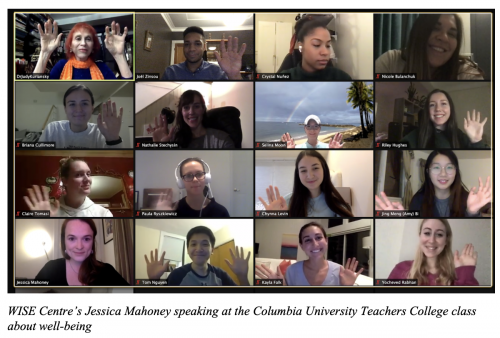 A project in development by the WISE Centre examines the relationship between well-being and mental health, a focal topic for the seminar class. Measurement of this relationship is still early in development, but includes a multilayer, multidimensional approach. The research aims to examine how mental health relates to different components of the OECD’s well-being framework, “…including those that are historically ignored or understudied, such as quality of relationships in social connections, as well as civic engagement, the relationship between people and government and institutions” (Mahoney, 2020). Measuring mental health within the context of well-being will provide advocates of mental health evidence-based tools, which are a crucial component to viable policy approaches.
A project in development by the WISE Centre examines the relationship between well-being and mental health, a focal topic for the seminar class. Measurement of this relationship is still early in development, but includes a multilayer, multidimensional approach. The research aims to examine how mental health relates to different components of the OECD’s well-being framework, “…including those that are historically ignored or understudied, such as quality of relationships in social connections, as well as civic engagement, the relationship between people and government and institutions” (Mahoney, 2020). Measuring mental health within the context of well-being will provide advocates of mental health evidence-based tools, which are a crucial component to viable policy approaches.
Accomplishing this task requires funding, lack of which has to-date hampered progress in this area. However, Mahoney reported optimistic news, explaining that some governments are already allocating funds in response to the crisis of well-being being exacerbated in this age of the COVID-19 pandemic, which has unleashed severe stress, demanding mental health attention.
Another hurdle is that definitions of well-being within the policy-making process remain somewhat narrow and divergent (Dodge, Daly, Huyton, et al, 2012). To break through this block, Mahoney explained, decisions grounded in OECD’s “dashboard” approach will broaden the definition of outcomes. Examining a wide range of outcomes through a holistic approach will better measure well-being initiatives.
Assessment needs to include quality measures, not just quantitative amounts, e.g., about amounts governments spend on systems (such as schools, food, transportation) reported as GDP (Gross Domestic Product). Traditionally, GDP “is the standard measure of the value added, created through the production of goods and services in a country during a certain period. As such, it also measures the income earned from that production, or the total amount spent on final goods and services (less imports)” (OECD, “GDP” section, n.d.).
The perspective of the OECD WISE Centre is to go “beyond GDP” (a slogan also used in the above-mentioned advocacy during the UN 2030 Agenda SDGs negotiations that also recommended the importance of measuring alternatives to GDP, like well-being) to focus on people and not just prosperity in terms of development.
GDP can serve as an important variable in assessing development in aspects like health and education over time, Mahoney said, but using only GDP as a factor in policy excludes subjective measures that offer a more realistic and complete understanding of progress. Much research has been done by psychologists and economists on the value of these subjective measures, predominantly led by experts like Ed Deiner and colleagues.
Rather than choosing one aspect over another, the WISE Centre’s well-being framework will involve research of both subjective and objective characteristics. Subjective aspects combine measures such as self-reported life satisfaction, quality of relationships, and trust within your community. Objective aspects include income and employment.
New Zealand is a good example of how this approach is working in practice, explained Mahoney, whereby the country is applying its well-being framework through the budgetary process. Deputy Prime Minister and Minister of Finance Hon. Grant Robertson is a speaker at the OECD’s Wise Centre launch, described below in Part 2 of this report.
Grounding the inclusion of well-being in the Finance Ministry is significant. Yet, various ministries must work together, and are required to request funding utilizing the well-being framework.
“The Treasury has developed a cost-benefit analysis tool that's quite involved that is tied to the well-being framework,” Mahoney said. “There's an actual tool that civil servants are now using.” (Mahoney, 2020).
From the jumping off point of the Treasury, the New Zealand government is applying a well-being framework throughout all aspects of its policy approaches. As a result, well-being is becoming “institutionalized”, namely, an integral part of the process of government.
The value of the new WISE Centre is vast, that “will generate new data and solutions to improve people’s well-being and reduce inequalities and better understand the impact of policies and business actions on people’s lives today and, in the future” (Mahoney, 2020).
The dashboard of the WISE Centre’s well-being framework aligns well with the UN 2030 Sustainable Development Goals (SDGs), evident in three examples:
- ‘Income & Wealth’overlaps with UN SDG 1 (eradicate poverty) and SDG 2 (eradicate hunger);
- ‘Work & Job Quality’ overlaps with SDG 8 (decent work & economy); and
- ‘Work-life balance’ intersects with SDG 8 (decent work & economy).
The OECD well-being framework is challenged to align with the SDGs in SDG 17, which addresses means of implementation, global contributions, trans-boundary effects, and international efforts.
Together, the OECD framework, in tandem with the UN SDGs, cover wide terrain in addressing matters of well-being.
As individuals around the globe continue to be affected by the deadly COVID-19 pandemic, the past year has been a laborious process of shifting a worldwide mindset, explained Mahoney. Measures to prevent the spread of the pandemic, including physical distancing, mask-wearing, and grave personal challenges such as quarantines and isolation from loved ones, have separated people from each other. The pandemic has shaken people’s notions of reality, connection, and work, in other words, our ‘normal’ has fundamentally changed.
The pandemic has led to ironic comparisons of opposites, Mahoney pointed out. Public health directives call for separation from each other; yet, the pandemic has revealed the visceral human need for interconnectedness. In another stark contrast, the pandemic has led to many deleterious outcomes – illness, loss of income, boredom, apathy, loss of human contact, loss of hope, increased rates of addiction, domestic violence, child abuse, lack of supports for dependents, and at worst, massive death rates. But positive outcomes have emerged, such as better hygiene awareness and practices; innovative ways to connect and entertain; low-cost mental health and well-being services; and a significant improvement in air quality.
In another positive outcome, the impact of the pandemic has also highlighted gaps in access to quality services necessary for psychosocial well-being, and has also pushed organizations to re-examine how to approach supporting people, especially those most vulnerable. Fulfilling these needs is urgent, given the target date of the year 2030 to achieve the United Nations 2030 Sustainable Development Goals (SDGs), as outlined in the document agreed upon by 193 Member States of the UN (UN, “sustainable development goal” section, n.d.).
Some governments, Mahoney outlined, are using Wellbeing in their operations, as shown in the figure entitled “Some of the mechanisms used so far”. For example, in France, Italy, Sweden and New Zealand, well-being informs the budget process. Scotland, Slovenia, Paraguay and Finland integrate well-being in national development plans. New well-being structures are in the UK (“What Works Centre”), Wales, Ecuador and the UAE. The UK and New Zealand have policy tools for civil servants.
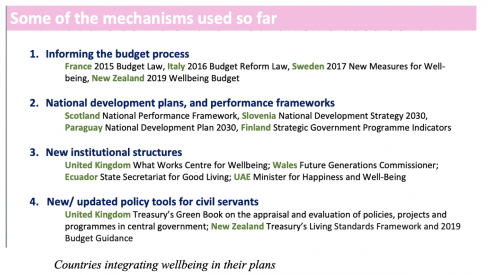 The WISE Centre’s framework identifies the goals of Well-being, Inclusion, Sustainability, and Equal opportunity in order to create actionable steps to “Build Back Better.” The “Build Back Better (BBB)” term had been used in international fora before, notably, adopted by the UN World Conference on Disaster Risk Reduction in Sendai, Japan, in 2015, and used by . the UN Office for Disaster and Risk Reduction, to refer to recovery, rehabilitation and reconstruction. (UNDRR,“Sendai Framework for Disaster Risk Reduction 2015-2030” section, 2015). Important questions that emerge in this regard include: “How do we move beyond the year of 2020 to achieve those goals in the UN Agenda by 2030 for a more inclusive, equitable and fair world for all?” “How can we support those who do not have access to quality services?”and “How do we, in fact, ‘Build Back Better’?”
The WISE Centre’s framework identifies the goals of Well-being, Inclusion, Sustainability, and Equal opportunity in order to create actionable steps to “Build Back Better.” The “Build Back Better (BBB)” term had been used in international fora before, notably, adopted by the UN World Conference on Disaster Risk Reduction in Sendai, Japan, in 2015, and used by . the UN Office for Disaster and Risk Reduction, to refer to recovery, rehabilitation and reconstruction. (UNDRR,“Sendai Framework for Disaster Risk Reduction 2015-2030” section, 2015). Important questions that emerge in this regard include: “How do we move beyond the year of 2020 to achieve those goals in the UN Agenda by 2030 for a more inclusive, equitable and fair world for all?” “How can we support those who do not have access to quality services?”and “How do we, in fact, ‘Build Back Better’?”
Chinese poet and philosopher Sun Tzu said, “In the midst of chaos, there is also opportunity,” that coincides with the above-made points about positive outcomes of the pandemic tragedy. It is notable that international organizations have made it their mission to re-examine their priorities, and have developed exciting new initiatives related to the inclusion of well-being. Specifically, some governments are finally integrating well-being as part of their mandates.
In presenting an overview of the history of OECD, Mahoney described that the OECD was officially born on 30 September 1961, derived from The Organisation for European Economic Cooperation (OEEC). The mission of the OECD is to assist countries in shifting towards growth mindsets with “evidence-based international standards” while finding solutions to “a range of social, economic and environmental challenges” with the goal “to shape policies that foster prosperity, equality, opportunity and well-being for all.” (OECD, n.d.) 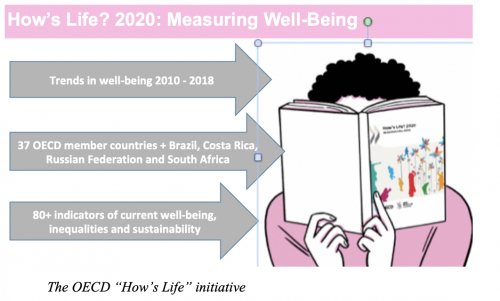
In 2010, the OECD established the “How’s Life” initiative, which measures quality of life satisfaction in participating OECD countries. Prior to the pandemic, people reported that life was better than a few years prior; however, the pandemic has reversed this trend, such that people feel increasingly disconnected.
In summary, said Mahoney, given the pandemic, “There has never been a more important time for the OECD to create the Centre on Well-being, Inclusion, Sustainability and Equal Opportunity (WISE), which will ensure that delivering better lives for all, both now and in the future, remain at the heart of COVID-19 response and recovery strategies.” (OECD, 2020)
Part 2.: The OECD roundtable official launch of the WISE Centre
On 25 November 2020, the OECD held a high-level virtual roundtable discussion with participating governments and organizations to officially launch the new Centre for Well-being Inclusion Sustainability and Equal Opportunity (WISE).
The event was held to explore potential wide-range strategies to improve well-being, with the goals for the Centre, as reflected in its acronym, to focus on Well-being, Inclusion, sustainability, and Equal opportunity within participating entities.
The goal of the Centre is to put people first, in order to “Build Back Better.”
The WISE team is composed of 30 economists, policy analysts, and statistical experts with diverse backgrounds and nationalities (OECD, 2020). Their intent is to “generate new evidence, new tools and policy solutions” in order to improve the lives of people in domains related to well-being, inclusiveness and sustainability. The WISE Centre will act on “advising policy responses to urgent challenges posed by crisis and helping to align these responses with long-term objectives, like the United Nations Sustainable Development Goals (SDGs)… done in a number of ways, such as developing measurement guidelines, improving statistical measures, and exploring root causes of inequalities” (OECD, 2020).
Opening Remarks
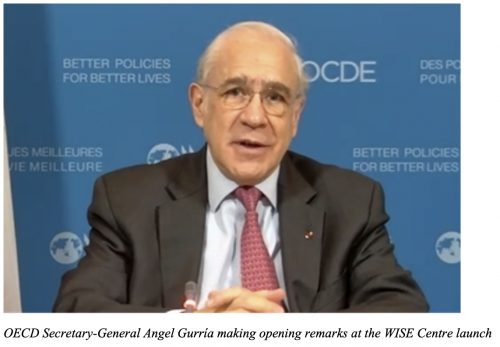 Participating guest speakers for the roundtable included the OECD Secretary-General and Deputy Secretary-General, as well as various representatives who have all “…integrated well-being as part of their mandate [and have had] innovative experiences and good practices to share and discuss, shedding light on possibility and actionable goals” (Knudsen, 2020).
Participating guest speakers for the roundtable included the OECD Secretary-General and Deputy Secretary-General, as well as various representatives who have all “…integrated well-being as part of their mandate [and have had] innovative experiences and good practices to share and discuss, shedding light on possibility and actionable goals” (Knudsen, 2020).
In opening remarks, OECD Secretary-General Angel Gurría set the stage by giving an overview of the latest global economic projections, which reflect a steep decline. Those countries most vulnerable have been hit the hardest, since those in low-socioeconomic circumstances have not had access to the technological and educational support that is imperative for growth and development. Women have also been disproportionately affected, Gurria noted, due in part to an overwhelming increase in caretaking responsibilities. He presented evidence of concerning declines in social connectedness, psychological well-being, and mental health, with approximately 20% of people from OECD participating countries reporting symptoms of anxiety and depression.
The audience initially began with approximately 497 people and soon rose to 700 people, attending from all over the world. It was pointed out that months ago, such an event would not have been accessible to so many people as the online platform now provided, nor might it have been as well-attended, which likely demonstrates an eagerness to learn about how reputable organizations like the OECD are approaching solutions.
OECD Deputy Secretary-General Ulrik Vestergaard Knudsen opened the roundtable discussion, speaking to the point that “…new times call for new ideas…” (Knudsen, 2020). He went on to describe the evolution of OECD’s work. Ten years ago, following the OECD’s 50th anniversary, well-being and inclusion were established at the forefront of their work via the Better Life Initiative and the Inclusive Growth Initiative, developed to address the 2007-2008 Global Financial Crisis. Two connected questions were applied at the time: “What matters to the people, with the ability to measure what matters?” and “What are the policies and economic growth we need to improve people’s lives?” The WISE Centre will continue to advance this agenda and build upon the progress and lessons learned over the past ten years. The WISE Centre will also bring together the measurement policy aspects of the global agenda and strengthen the OECD activities in Well-being, Inclusion, Sustainability and Equality. A step forward is discussing the importance of a recovery from the pandemic that is strong, green, inclusive, and resilient. Previous objectives that exclusively focus on economic growth alone, he said, are no longer considered or adequate.
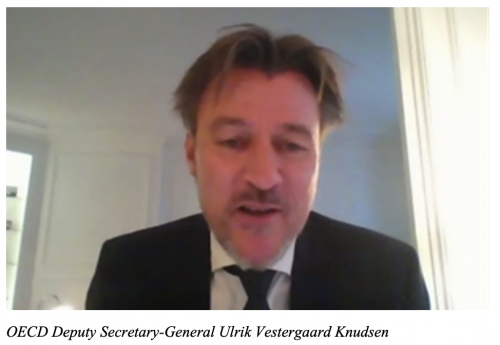 Knudsen emphasized the overlap between the OECD agenda and that of the UN 2030 Agenda for Sustainable Development “…which promotes a multidimensional policy and a strong partnership between governments and civil society”. Thus, the topics covered during the roundtable discussion correlated with the SDGs in the UN 2030 Agenda, highlighting progress towards specific SDGs. These include efforts marked in SDG 3 (Good Health and Well-being for all), SDG 4 (Quality Education), SDG 8 (Decent work and Economic growth), SDG 10 (Reduced Inequalities), SDG 11 (Sustainable Cities), SDG 12 (Responsible consumption and production), SDG 13 (Climate Action), SDG 16 (Peace, Justice and Strong institutions) and SDG 17 (Partnerships).
Knudsen emphasized the overlap between the OECD agenda and that of the UN 2030 Agenda for Sustainable Development “…which promotes a multidimensional policy and a strong partnership between governments and civil society”. Thus, the topics covered during the roundtable discussion correlated with the SDGs in the UN 2030 Agenda, highlighting progress towards specific SDGs. These include efforts marked in SDG 3 (Good Health and Well-being for all), SDG 4 (Quality Education), SDG 8 (Decent work and Economic growth), SDG 10 (Reduced Inequalities), SDG 11 (Sustainable Cities), SDG 12 (Responsible consumption and production), SDG 13 (Climate Action), SDG 16 (Peace, Justice and Strong institutions) and SDG 17 (Partnerships).
It was evident that this webinar launch itself embodied SDG 17 in that the panelists represented varied points of view, and were collaborating collectively towards the mission of the WISE Centr initiative. Further, the Centre’s initiative demonstrates willingness to address policies that advance international approaches to Well-being, Inclusions, Sustainability, and Equal-opportunity.
In further acknowledgement of the value of partnership and inclusion of the Centre, public perception is key to the success of the framework, Knudsen added, as well as to the outcome the Centre is attempting to achieve.
Questions from the audience that were submitted centered around two questions:
- What is established already with the purpose of well-being and inclusion?
- What is each speaker’s perspective on strategies in order to “build back better” from the results of the COVID-19 pandemic?
With no time for responses from the floor at this point in the program, it was announced that these points will be addressed during future interactive and thematic webinars in 2021, on dates to be determined.
The Roundtable Discussion
For the next roundtable discussion, panelists included: Her Royal Highness, Princess Laurentien of the Netherlands; Hon. Grant Robertson, New Zealand Deputy Prime Minister and Minister of Finance (mentioned above in this report); Hon. Mona Fortier, Canada’s Minister of Middle-Class Prosperity and Associate Minister of Finance; Aino-Kaisa Pekonen, Finland’s Minister of Social Affairs and Health; Saila Ruuth, Finland State Secretary to Minister of Social Affairs and Health; Olivia Grégoire, Minister of State for the Social, Inclusive and Responsible Economy, attached to the Minister of the Economy, Finance and the Recovery, in France; and Martin Abregu, Vice President for International Programs at the Ford Foundation. Their reports were meant to highlight experiences of their respective country.
Finland
In introducing the speakers from Finland, OECD Deputy Secretary-General Knudsen serving as moderator, noted Finland’s strong leadership in establishing the concept of “economy well-being,” which emphasizes the important economic benefits arising out of investments towards well-being. Knudsen described Finland’s goal to “enhance understanding of the fact that well-being is a prerequisite for economic growth and for social and economic stability.” (stm.fi, n.d.) As a result, he said, the “economy well-being” approach has helped unlock new perspectives for managing the current pandemic crisis.
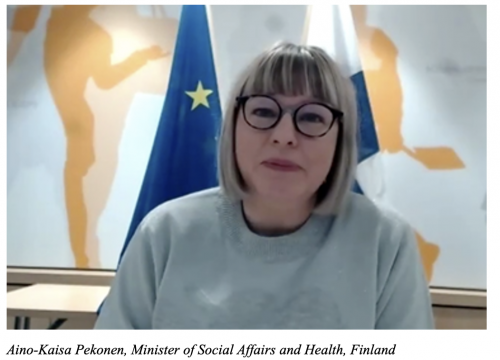 Explaining this approach from her country’s perspective, the Minister of Social Affairs and Health of Finland, Aino-Kaisa Pekonen, shared Finland’s belief that it is possible to protect the most vulnerable while strengthening the economy. She emphasized that Finland’s plan is a long-term approach, and that there is no room for a quick fix. Finland has also evaluated the social and economic consequences of service disruptions in order to minimize negative impacts of the pandemic. She spoke about the importance of recognizing what is working, such as current digital approaches, which demonstrate the potential of new technologies which can support overall well-being. Further, these solutions are economically efficient, and offer tools in developing strategies to act against climate change (SDG 13).
Explaining this approach from her country’s perspective, the Minister of Social Affairs and Health of Finland, Aino-Kaisa Pekonen, shared Finland’s belief that it is possible to protect the most vulnerable while strengthening the economy. She emphasized that Finland’s plan is a long-term approach, and that there is no room for a quick fix. Finland has also evaluated the social and economic consequences of service disruptions in order to minimize negative impacts of the pandemic. She spoke about the importance of recognizing what is working, such as current digital approaches, which demonstrate the potential of new technologies which can support overall well-being. Further, these solutions are economically efficient, and offer tools in developing strategies to act against climate change (SDG 13).
Using new technology, however, comes with certain heightened ethical considerations, such as data protection and privacy.
An important part of Finland’s approach, she emphasized, is putting people at the center of the decision-making, with this approach representing another overlap with the UN Agenda 2030.
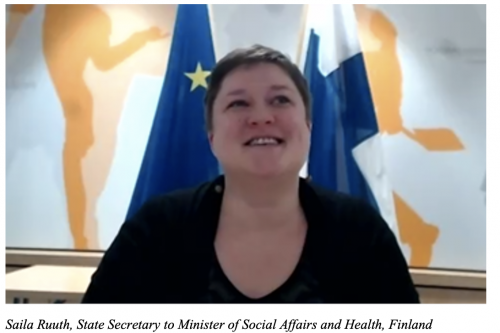 In the second round of the discussion, State Secretary to the Minister of Social Affairs and Health of Finland, Saila Ruuth, continuing the presentation about Finland. She first underscored the importance of the WISE Centre, considering the heightened need to focus on well-being in these times. She went on to explain that Finland’s long-term resolution is based on work that began in the 1970s, which stems from a forward-thinking approach to reducing inequalities. Building on the previous Finnish speaker’s presentation, she mentioned that Finland is a leader in the world for well-being and safety. However, she admitted that there is room for growth in addressing inequalities, particularly health inequalities related to gender and socio-economic status. For example, a person of lower socio-economic status has a lifespan of ten years less than those of higher socio-economic status.
In the second round of the discussion, State Secretary to the Minister of Social Affairs and Health of Finland, Saila Ruuth, continuing the presentation about Finland. She first underscored the importance of the WISE Centre, considering the heightened need to focus on well-being in these times. She went on to explain that Finland’s long-term resolution is based on work that began in the 1970s, which stems from a forward-thinking approach to reducing inequalities. Building on the previous Finnish speaker’s presentation, she mentioned that Finland is a leader in the world for well-being and safety. However, she admitted that there is room for growth in addressing inequalities, particularly health inequalities related to gender and socio-economic status. For example, a person of lower socio-economic status has a lifespan of ten years less than those of higher socio-economic status.
To address this problem, she said, it is important to incorporate multiple areas of government towards similar objectives, while also involving various salient stakeholders (e.g., civil societies, social partners, businesses and research institutions). Success must be measured through four priority areas:
- Opportunity for all to get involved;
- Good everyday environments;
- Measures and services promoting well-being and health; and
- Decision-making generates effectiveness” (stm.fi, 2020).
With this approach in mind, Finland’s government is establishing an action plan.
Canada
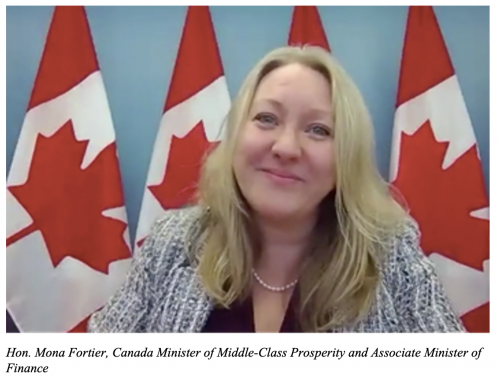 The next speaker presented Canada’s response to the Coronavirus. The Honorable Mona Fortier, Minister of Middle-Class Prosperity and Associate Minister of Finance, explained that Canada intervened quickly in order to minimize the spread of the virus, putting in place emergency programs to help its citizens. The government has been able to protect jobs with economic support, as well as the health of families who are at a higher risk of decline, thus, addressing SDGs 1, 3 and 10. Financial support was given to unemployed individuals, as well as to families in need, students, the elderly, and those with disability. The government also provided business loans to companies, as well as financial subsidies to help pay wages.
The next speaker presented Canada’s response to the Coronavirus. The Honorable Mona Fortier, Minister of Middle-Class Prosperity and Associate Minister of Finance, explained that Canada intervened quickly in order to minimize the spread of the virus, putting in place emergency programs to help its citizens. The government has been able to protect jobs with economic support, as well as the health of families who are at a higher risk of decline, thus, addressing SDGs 1, 3 and 10. Financial support was given to unemployed individuals, as well as to families in need, students, the elderly, and those with disability. The government also provided business loans to companies, as well as financial subsidies to help pay wages.
A national platform was launched for Canadians to access mental health services, called, “Wellness Together Canada”, which was available for free to all Canadians, 24/7. The government also provided support to shelters and food banks. She emphasized that the economic plan was large enough within the scope of their budget to help those who needed it most even though, she admitted, gaps in support were more evident in vulnerable populations.
Hon. Fortier echoed the importance of a long-term approach brought up by previous speakers, noting the importance of solutions to better the well-being of Canadians over the long term.
She also emphasized the importance that OECD partner countries and civil society work together in order to achieve progress.
Protection of indigenous peoples, a longstanding commitment of the Canadian government, is increasingly important during the pandemic, she said. Acknowledging the indigenous peoples of the Algonquin Anishinabeg Nation, from whose land she was speaking, she praised this community as the past, present, and future caretakers of the land.
Canada is working towards establishing a “Life Quality Standard” in order to help improve quality of life and tackling solutions to meet the systematic challenges that Canadians are facing. This standard will also help the government to operationalize the mandate to “Build Back Better” and to earmark investments towards what matters most for Canadians.
Physical, financial and mental health of the population is at the heart of the Canadian government’s concerns. She concluded that the government’s commitment is to improve quality of life for all Canadians, particularly the middle class and those striving to enter the middle class. This involves creating a million jobs, investing in training workers and creating an early learning and childcare system, as well as reaching net zero emissions by 2050 to combat climate change (SDG13).
New Zealand
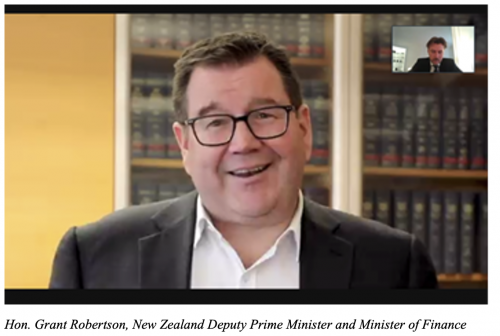 OECD has a long history with the government of New Zealand. More recently, OECD Deputy Secretary-General Knudsen and New Zealand’s Deputy Prime Minister and Minister of Finance Hon. Grant Robertson, launched the OECD Economic Survey, with a special focus on the well-being budget, one of the first of its kind in the world. New Zealand’s well-being budget was based on a living standards framework, grounded in the work of the OECD, building their plan from the reputable and strong source of statistics and analysis offered by OECD.
OECD has a long history with the government of New Zealand. More recently, OECD Deputy Secretary-General Knudsen and New Zealand’s Deputy Prime Minister and Minister of Finance Hon. Grant Robertson, launched the OECD Economic Survey, with a special focus on the well-being budget, one of the first of its kind in the world. New Zealand’s well-being budget was based on a living standards framework, grounded in the work of the OECD, building their plan from the reputable and strong source of statistics and analysis offered by OECD.
By working within the OECD framework, Minister Robertson explained that New Zealand is excited about centering their work around improving people’s lives by making a budget that is “more real.” He described the clear framework that the New Zealand government has been developing and applying to policymaking, using robust resources, evident in the work of the OECD, in order to have assurance in the implementation in their policies.
In his pre-recorded message, Minister Robertson described the need for an “end-to-end well-being approach” within the creation of their country budgets. This includes measuring how they work with a wide set of indicators, measured by how well-being impacts four capitals, or pillars, namely:
- human capital/people;
- natural capital/environment;
- financial capital/money; and
- social capital/communities.
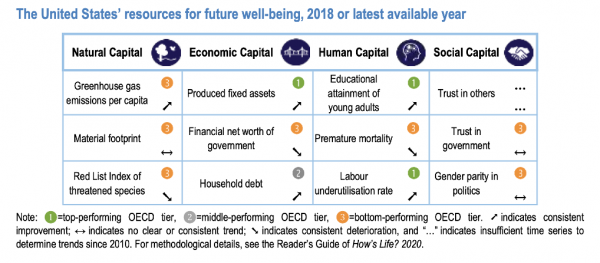 All four pillars are weighed in order to achieve a balanced “well-being budget”.
All four pillars are weighed in order to achieve a balanced “well-being budget”.
Science advisors are involved in the early part of the development process. Then, government ministers work in teams to coordinate across the priorities examined.
Immediate issues are most important to plan for long-term goals, but they also examine intergenerational impacts, looking at the here-and-now as well as at long-term outcomes (as similarly noted by both Finland and Canada earlier).
The New Zealand government recognizes that mental health and well-being, as outlined in SDG 3 of the UN Agenda 2030 for Sustainable Development, was originally significantly underrepresented. Therefore, it was emphasized in their budget.
An effort was also made to create synchrony with the theme of cooperation and coordination within government agencies, for example, ten different government agencies came together to address domestic violence with one single approach to eradicate this serious social problem.
In order to genuinely shift the dialogue within the context of the intention to establish a well-being budget, the New Zealand government used a dashboard of indicators, composed of traditional measures and subjective measures of well-being, such as life satisfaction.
To combat the pandemic, they felt that an economic response was the strongest approach, but that “in order to protect livelihoods, (they) had to protect lives.” Thus, they determined that a holistic framework is best, thereby including consideration of well-being and the dashboard of indicators, to describe how they function in developing policies and programs.
In another dimension of the country’s commitment to the application of well-being, legislative changes place the well-being objective as part of the presentation and discussion of every topic regarding the formulation of their budget. For example, well-being is considered when regarding SDG 1 – specifically, child poverty -- alongside other indicators, in efforts to establish next steps in policy and programs towards reducing inequalities.
Another good example of their approach, he noted, is having a long-term, preventative approach to policymaking.
Despite these impressive steps, he said that the government’s approach is a work in progress, admitting that not everything has worked. However, the government is moving towards progress by “shifting the dialogue”.
France
Minister of State for the Social, Inclusive and Responsible Economy in France, Olivia Grégoire, attested to the French government’s goal to ensure the pandemic recovery plan by engaging in fundamental changes to their current economic model.
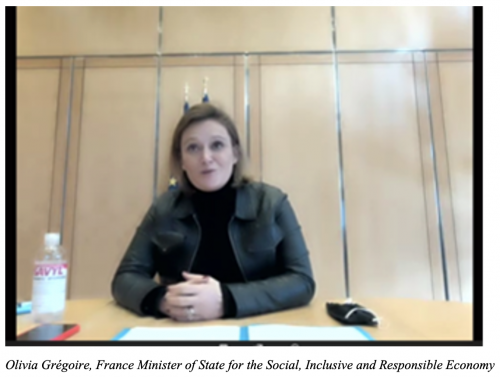 She quoted Sir Winston Churchill, “We don’t get to waste this crisis,” as a mantra in making changes.
She quoted Sir Winston Churchill, “We don’t get to waste this crisis,” as a mantra in making changes.
In response to the pandemic, she explained, the stimulus package of the French government was dedicated to the environmental transition, social cohesion, and support to the most vulnerable, in a greener, fairer economy.
Minister Grégoire noted her agreement that governments should not work alone, and that inclusive and sustainable growth is only possible when involving the private sector. She offered a good example, evident in her involvement in building the PACTE Bill for growth and transformation, adopted by the National Assembly several years ago. The PACTE Bill, she explained, “will facilitate access to diversified funding (public listing, investment capital, crowdfunding and ICO). It will orientate French citizens’ savings towards companies’ equity capital to fund future growth and innovation.” Essentially, this Bill encourages companies to follow a mission-based approach versus a mercenary one. Therefore, internal and external parties (such as shareholders) are involved and committed to ensure that the purpose of the company’s mission is consistent with action, enabling transparency of non-financial performance. This transparency is meant to create a guideline so that companies are following best practices, sharing them, and meeting the expectations of consumers.
She further described the example of the European Union’s work on reviewing the Non-Financial Reporting Directive. EU law requires large companies to disclose certain information on how they operate, and how they manage social and environmental challenges.
European countries should work together in building and strengthening Europe’s financial performance, she said.
France is also exploring innovative practices, she said, including social impact bonds, since “The Social Impact Bond is a sustainable finance innovation helping to place goals for the common good at the heart of the economy.” (“ec.europa.eu”, 2020).
In looking at economic performance and social impact, France is putting forward public and private partnerships in the field of social innovation, which is at the heart of their mandate. If these projects achieve environmental and social objectives, she explained, then investors receive a return paid by the state — but only if their performance measures exceed the goals.
Consistent with a reinforcing and inclusive approach, France is moving away from only providing subsidies included in their mandate and social impact bonds, by using a private financing approach towards building services for a social economy, which similarly needs the tools of a traditional economy. The goal is to simplify social impact bonds by linking them thematically to different causes. Organizations are supported via a “skills center” to share information.
The Ford Foundation
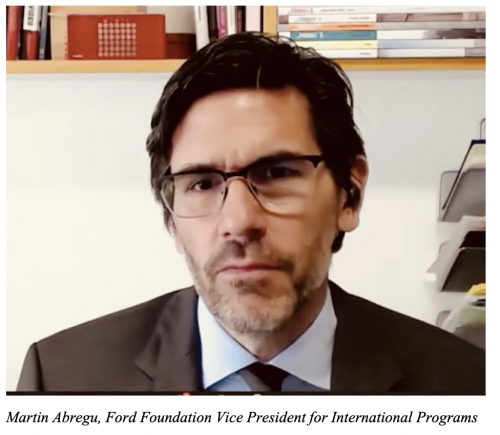 Vice President for International Programs for the Ford Foundation, Mr. Martin Abregu, spoke to the importance of involving multiple populations in discussions related to the pandemic, particularly those directly affected by inequalities and those historically marginalized, reflected in SDG 10 of the UN Agenda 2030 about reduced inequalities. The Ford Foundation focuses their work in several areas, including, but not limited to, gender-based violence and natural resources. Further, the Foundation believes in forging partnerships with Civil Society Organizations (CSOs) collaborating with governmental institutions to make them more inclusive and responsive. These partnerships are critical to finding accurate indicators to help those who are marginalized and ensure accountability.
Vice President for International Programs for the Ford Foundation, Mr. Martin Abregu, spoke to the importance of involving multiple populations in discussions related to the pandemic, particularly those directly affected by inequalities and those historically marginalized, reflected in SDG 10 of the UN Agenda 2030 about reduced inequalities. The Ford Foundation focuses their work in several areas, including, but not limited to, gender-based violence and natural resources. Further, the Foundation believes in forging partnerships with Civil Society Organizations (CSOs) collaborating with governmental institutions to make them more inclusive and responsive. These partnerships are critical to finding accurate indicators to help those who are marginalized and ensure accountability.
The impacts of COVID-19 are a confirmation of needs, Abregu said, agreeing with other speakers that the pandemic has highlighted what already has not worked. Therefore, he said, we need to make the most out of this crisis to ensure that people’s voices are heard, as the outcome of the pandemic will look different to different people. He empathically stated the importance of building personal and financial resilience, especially of people who are most gravely affected by the pandemic, and emphasized that it is crucial to build a platform for stakeholders to listen to each other, and to secure open civic spaces.
The Netherlands
Her Royal Highness Princess Laurentien of the Netherlands pointed out that prior to the pandemic, well-being was a thing of luxury, in other words, “a nice thing to have versus a necessity.” The Princess urged governments to reverse this approach, and encouraged them to identify efforts revealing what did not work prior to the pandemic.
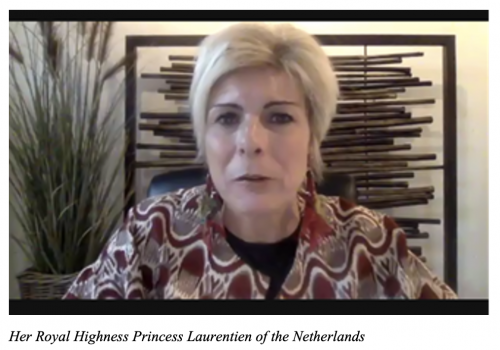 She further acknowledged the importance of a participative approach. In her view, a multidisciplinary approach is necessary towards a plan to “build back better.” However, a participative approach to policy development poses its own set of challenges, she noted. A new mindset is required of policymakers, whereby stakeholders give up preconceived solutions to problems (“a siloed approach”) and instead, engage in dialogue with civil society on focused solutions.
She further acknowledged the importance of a participative approach. In her view, a multidisciplinary approach is necessary towards a plan to “build back better.” However, a participative approach to policy development poses its own set of challenges, she noted. A new mindset is required of policymakers, whereby stakeholders give up preconceived solutions to problems (“a siloed approach”) and instead, engage in dialogue with civil society on focused solutions.
“Dialoguing with civil society requires humility,” she explained, “and listening between the lines to all people’s concerns.” In this way, The Princess promoted a humanistic approach, emphasizing that the lives of people cannot be categorized the way that most governments do.
Dialogue with people on the ground is critical, Princess Laurentien stressed, focusing on the psychological principle of “empathy” to better understand what is at stake.
She pointed to the positive example of New Zealand, described in the earlier presentations, as a model in line with an actionable and realistic approach to improving well-being.
“A focus on people in need is crucial”, she emphasized, given that the stark reality that groups in need have increased in number.
Consistent with comments from previous speakers, the Princess recommended long-term strategies, but also stressed the need to conceive plans for prevention. She noted that governments find this difficult, due to the necessity this approach requires to go beyond political mandates—something governments are often hesitant to do. Ultimately, however, a long-term strategy is akin to prevention, she said, and ultimately a direction that will be a win-win for all.
Also consistent with the statements of other speakers, she noted that participation of many stakeholders (according to SDG 17) is fundamental in order to make things happen effectively. This pandemic has shown, she explained, that the actions of one country alone is inadequate, and also that collaboration with the public is key to find solutions to problems. She credited the WISE Centre as impactful in promoting these relationships.
Concluding remarks
In his concluding remarks, OECD Secretary-General Gurria described the WISE Centr eas an inauguration towards work on equality and well-being at the OECD, arising from the necessity of a different approach to the existence of large inequalities. The Centre is committed to turn this promise into a reality, by offering tools to OECD countries and partnering countries. He pledged that the WISE Centre will rise to the challenge in a collaborative process, that will have a global impact to “Build Back Better” after the COVID-19 pandemic.
REFLECTIONS
Throughout the conference, all presenters spoke of the need for a participatory culture to shift the dialogue towards a people-centered approach to policymaking. The involvement of science and research is at the core of systems that can work effectively to help implement Well-being, Sustainable, and Inclusive communities of people. The vast team of experts at the WISE Centre are able to offer evidence-based facts to build “the framework to support reforms” and to “provide a forum to foster international debates, sharing knowledge and experiences” (OECD, 2020).
As such, the WISE Centre’s framework aligns with the UN SDGs, with a focus on fostering Goal 17, to forge partnerships towards a participatory culture. Many speakers shared that they have been reexamining their approach to policymaking, that has enabled governments to find better solutions, for example, towards SDG 13 about Climate Action, with optimism about making the necessary impact.
Every speaker expressed gratitude for the opportunity to collaborate with the OECD WISE Centre in this launch event, and for the occasion to share what has been working in their country or organization.
Jessica Mahoney, Research Assistant of the Wise Center – who was a guest speaker to the class described above in Part 1 of this report – summed up the WISE Centre’s goals to:
- expand the quality of relationships with participating countries by measuring the impact of well-being, inclusion, sustainability and equal opportunity;
- apply a framework that works towards a harmonization of inequalities; and
- follow the objective to ‘Build Back Better’ and to build more resilient societies to weather future crises”.
She noted that the eagerness of the speakers at this WISE Centre launch holds promise for positive outcomes in the OECD efforts.
Clearly, the COVID-19 pandemic has reaffirmed that “we are all interconnected in crisis”, thus mandating the collaboration of organizations, governments and people. Working together towards making our world a better place -- where all people are understood within a well-being framework – holds promise for the possibility of synchronicity in global decision-making within worldwide crisis situations.
Note: Unless otherwise specified, all photos were captured by Nathalie Stechysin
Resources:
WISE Centre launch: http://www.oecd.org/wise/OECD-WISE-launch-event.htm
pdf description: https://www.oecd.org/wise/Peoples-well-being-at-the-top-of-the-agenda-WISE-mission.pdf
OECD website: https://www.oecd.org/general/oecdcentres.htm
@OECD_STAT | #howslife
References
Algonquin Anishinabeg Nation Tribal Council. (2016, September 01). http://www.anishinabenation.ca/en/about/
Better Life Initiative: Measuring Well-Being and Progress. (n.d.). https://www.oecd.org/statistics/better-life-initiative.htm
BNP Paribas and European Investment Fund launch €10 million fund for co-investment into Social Impact Bonds in the EU. (2020, February 04). https://ec.europa.eu/commission/news/bnp-paribas-and-european-investment-fund-launch-eu10-million-fund-co-investment-social-impact-bonds-eu-2020-feb-04_en
Coronavirus disease (COVID-19). (n.d.). https://www.who.int/emergencies/diseases/novel-coronavirus-2019/question-and-answers-hub/q-a-detail/coronavirus-disease-covid-19
Coronaviruses. (2020, November 20). https://www.nfid.org/infectious-diseases/coronaviruses/
COVID19 and Mental Health & Wellbeing. (n.d.). https://www.un.org/en/coronavirus/mental-health-and-wellbeing
Dodge, R., Daly, A., Huyton, J., & Sanders, L. (2012). The challenge of defining wellbeing.
International Journal of Wellbeing, 2(3), 222-235. doi:10.5502/ijw.v2i3.4
Economy of wellbeing. (n.d.). https://stm.fi/en/international-cooperation/the-presidency-of-the-council-of-the-eu/economy-of-wellbeing
GDP and spending - Gross domestic product (GDP) - OECD Data. (n.d.). https://data.oecd.org/gdp/gross-domestic-product-gdp.htm
Government of Canada connects Canadians with mental wellness supports during COVID-19. (2020, April 15). https://www.canada.ca/en/health-canada/news/2020/04/government-of-canada-connects-canadians-with-mental-wellness-supports-during-covid-190.html
Hassaballa, D. (2020, November 13). The "Second Wave" Is MUCH MUCH Worse. https://medium.com/beingwell/the-second-wave-is-much-much-worse-45083d443d0e
History. (n.d.). https://www.oecd.org/about/history/
How’s Life? (2020, March 20). Http://Www.Oecd.Org/Statistics/How-s-Life-23089679.Htm. http://www.oecd.org/statistics/how-s-life-23089679.htm
Inclusive Growth - Economic growth that is distributed fairly across society. (n.d.). https://www.oecd.org/inclusive-growth/
Kuriansky, J. (2012a). United Nations Conference on Well-being and Happiness. Press release
for international outlets. https://drive.google.com/file/d/1w_CIFZk_OpResG1AyYxYriXXiIEKfYjY/view?usp=sharing
Kuriansky, J. (2012b). Well being: An Important Issue at the United Nations and for the
International Association of Applied Psychology. Bulletin of the International Association of Applied Psychology, 24: 2-3 July/October, Part 10, 64-70. https://iaapsy.org/site/assets/documents/July2012.pdf
Kuriansky, J (2016, January). Success in the new Global Agenda Advocacy" in the Bulletin of the International Association of Applied Psychology. 28: 80-88. https://iaapsy.org/site/assets/documents/APNL_v28.pdf
Kuriansky, J. (2017) “Promoting Mental Health and Well-being for Youth as a Strategy for Social 2947 Integration and Poverty Eradication,” Report from the United Nations Representatives. IAAP Bulletin, 29: 2 July, 2017, pp. 80-87. https://iaapsy.org/site/assets/files/1082/apnl-_v29_i2.pdf
Kuriansky, J. & Margevich, A. (2017). Statement about the Importance of Psychosocial
Resilience and Mental Health and Wellbeing in the 2030 Agenda, on behalf of the Psychology Coalition of NGOs Accredited at the United Nations at The Global Platform for Disaster Risk Reduction, From Commitment to Action Cancun, Mexico, May 2017. https://www.dropbox.com/home?preview=PCUN+Cancun+GPDRR+2017+Psychosocial+Resilience+Statement+Dr+Judy+Kuriansky.docx
Kuriansky, J. & Zinsou, J. (2019) Mental Health and Well-being at the United Nations: Activities, Achievements and Contributions of the IAAP New York Team. Applied Psychology Around the World, 1(3), 16-28. https://iaapsy.org/site/assets/files/1082/apaw_vol1i3.pdf
Launch of the OECD Centre on Well-being, Inclusion, Sustainability and Equal Opportunity (WISE), 25 November 2020. (n.d.). http://www.oecd.org/wise/OECD-WISE-launch-event.htm
Launch of the OECD WISE Centre, 25 November 2020. (n.d.). https://www.oecd.org/about/secretary-general/oecd-sg-remarks-to-launch-oecd-wise-centre-november-2020.htm
Mahoney, J., Ms. (2020, November 17). WISE Centre and OECD Framework. Lecture presented at class, Psychology and the United Nations, Columbia University Teachers College, New York New York.
Maragakis, L. L., Dr. (2020, November 17). Coronavirus Second Wave? Why Cases Increase. https://www.hopkinsmedicine.org/health/conditions-and-diseases/coronavirus/first-and-second-waves-of-coronavirus
Non-financial reporting. (2020, February 21). https://ec.europa.eu/info/business-economy-euro/company-reporting-and-auditing/company-reporting/non-financial-reporting_en
PACTE, the Action Plan for Business Growth and Transformation. (n.d.). https://www.gouvernement.fr/en/pacte-the-action-plan-for-business-growth-and-transformation
Putting People's Wellbeing at the Top of the Agenda, WISE Mission. (n.d.). http://www.oecd.org/wise/Peoples-well-being-at-the-top-of-the-agenda-WISE-mission.pdf
Royal Government of Bhutan (2012). The Report of the High-Level Meeting on Wellbeing and Happiness: Defining a New Economic Paradigm. New York: The Permanent Mission of the Kingdom of Bhutan to the United Nations. Thimphu: Office of the Prime Minister. https://sustainabledevelopment.un.org/index.php?page=view&type=400&nr=617&menu=35
Sendai Framework for Disaster Risk Reduction 2015-2030. (n.d.). https://www.undrr.org/publication/sendai-framework-disaster-risk-reduction-2015-2030
Take that step. (n.d.).https://ca.portal.gs/
What does 'build back better' really mean? One of the world's top CEOs give us his take | | UN News. (2020, June 11).https://news.un.org/en/story/2020/06/1066152
WHO Coronavirus Disease (COVID-19) Dashboard. (2020, December 13). https://covid19.who.int/
Reported by Nathalie Stechysin, member of the Student Division of the International Association of Applied Psychology pursuing the Master’s Degree in Psychology in Education in the Department of Clinical Psychology at Columbia University Teachers College, and a student in Professor Judy Kuriansky’s class on “Psychology and the United Nations.” In addition to scholastic work, Nathalie has a background in the performing arts and visual arts, taught in the public-school system for nine years, and worked with people affected by brain injury and persons with complex communication needs who communicate with augmentative alternative communication. She is also a trauma-informed yoga teacher who is passionate about supporting those who are historically marginalized.
Dr. Judy Kuriansky is a noted clinical psychologist, Adjunct Professor of Clinical Psychology at Columbia University Teachers College teaching “Psychology and the United Nations”, former radio call-in host and TV reporter, author of many books, columnist for Black Star News, provider of psychosocial trainings after disasters, and an NGO representative of the International Association of Applied Psychology and the World Council for Psychotherapy at the United Nations where she advocates about mental health and well-being.
Jack Davis is an intern for the United Nations Mental Health and Wellbeing Taskforce, where he has worked on projects related to suicide prevention, domestic abuse, and the UN's LGBTQ+ network. He has degrees in Human Development and Political Science, and is currently an MFA student at New York University.
Cite this article as: Stechysin, Kuriansky & Davis (2020, November 18). Taking Well-being to the Next Step: Launch of the WISE Centre and Innovations in Government Policy responding to the Coronavirus pandemic. The International Association of Applied Psychology, IAAP at the United Nations, meetings and events. https://iaapsy.org/iaap-and-the-united-nations/reports-meetings-events/taking-well-being-to-the-next-step-launch-of-the-wise-centre-and-innovations-in-government-policy-responding-to-the-coronavirus/.
